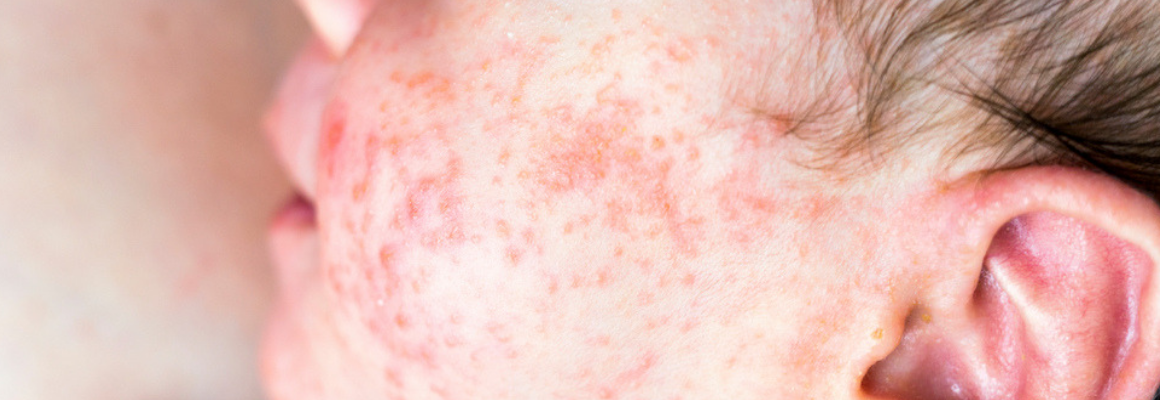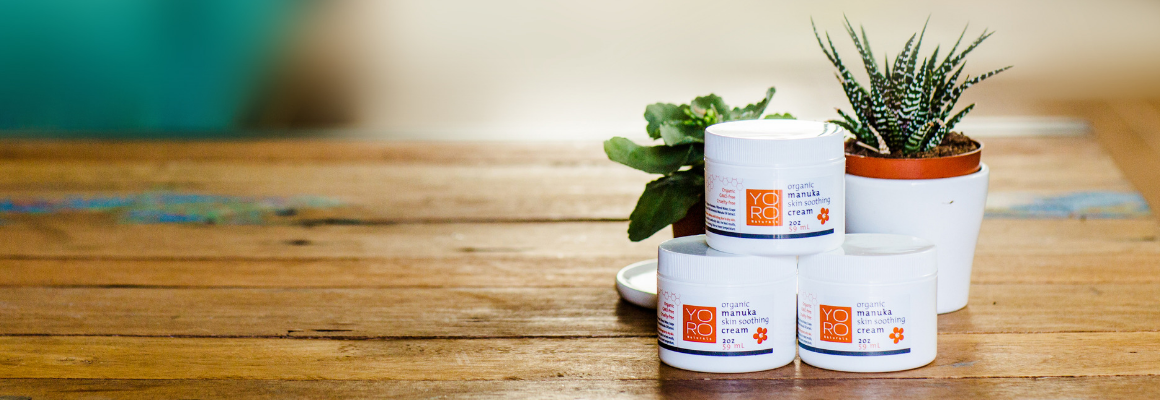Atopic dermatitis is actually one of many conditions to fall under the “eczema” umbrella.
Dermatitis is a group of skin conditions that differ slightly from one another. All types of eczema cause the affected area to appear irritated and feel itchy, but they can present very differently.
Different types of dermatitis produce different symptoms - from rashes to blisters – and vary in severity. The key to building a successful treatment or management strategy is to determine which type of eczema is at play. Once that is determined, it will be easier building a natural and holistic plan alongside a physician.
Keeping reading to learn more about the main differences between atopic dermatitis vs. eczema.
Atopic Dermatitis vs. Eczema?
Nobody really knows exactly what causes atopic dermatitis to develop in certain people. It can be an inflammatory response to an allergen or irritant that is environmental or internal (oftentimes from diet). It can also be inherited, but it can also develop with no genetic predisposition.
Atopic dermatitis is often linked to the “atopic triad”, a group of three conditions that tend to impact people simultaneously. It is composed of atopic dermatitis, hay fever, and asthma. This is an important factor to take into consideration when determining a proper course of treatment.
Atopic Dermatitis vs. Contact Dermatitis
Contact dermatitis is another common type of dermatitis that is caused by external irritants or allergens that touch the skin. This means that contact dermatitis occurs exclusively because of an external process. Atopic dermatitis can be external, but usually it is caused by food allergies.
Contact dermatitis often has a more direct treatment route which may be as easy as removing an environmental trigger from a daily routine. Atopic dermatitis often requires a more holistic approach that combines a controlled diet, monitoring environmental trigger, and symptom management.
Unfortunately, atopic dermatitis can lead to a few secondary issues that complicate matters. This makes it all the more essential to monitor affected areas, so any changes or developments can be caught early on.
Weakened Immune System
Atopic dermatitis keeps your body on high alert due to flare ups and ongoing symptoms. This seems as though it would improve your immune system, but in reality, it distracts it. If someone is suffering a flare up and a virus enters their system, the immune system will be concentrated on the dermatitis, and as a result, miss the outside invader.
Diet is also important for those suffering from atopic dermatitis not only because food sensitivities or allergies can be triggers, but a strong diet can also help boost the immune system.
Secondary Infection
Scratching skin excessively can cause further infection, such as a staph infection.
This is something that should be monitored with little ones, as they can easily scratch through their eczema patches, scales or blisters. Using specialized eczema cream for babies can help soothe their delicate skin.
Atopic Dermatitis Treatments
Because atopic dermatitis is usually triggered by environmental and food allergens, long term holistic approaches should be considered. As always, we recommend discussing various options with your health provider or consulting a naturopath or homeopath.
Prevent Scratching
This is especially important with little ones suffering from atopic dermatitis. Finding proper natural eczema treatments, as well as specialized clothing, can help soothe and protect their fragile skin.
Natural eczema cream such as this Organic Manuka Skin Soothing Cream contain manuka honey, which is known for its anti-itch and anti-inflammatory properties. Not only does it keep skin nourished and moisturized, but it can prevent further infection as well. Plus, kids love the smell!
If you or your little one are suffering from severely itchy skin, you can also try this Skin Soothers for Itchy Eczema that uses olive oil, beeswax and Chinese herbs to help repair and soothe skin.
Lastly, this Organic Aloe Vera for Eczema Spray is a fantastic soothing and cooling remedy due to the aloe vera and calendula ingredients. Pop it in the refrigerator for an extra cool relief.
Specialized Eczema Clothing
Eczema clothes can also play an important part of eczema therapy, specifically for atopic and contact dermatitis.
For people with contact dermatitis, garments such as these Remedywear™ gloves and sleeves prevent environmental triggers from coming into contact with skin.
Those who have to combat atopic dermatitis may need more full coverage options, such as shirts or pants. Remedywear™ is made from TENCEL and anti-inflammatory zinc, which helps soothe skin while protecting it from external irritants and allergens.
For advanced eczema therapy, we also suggest looking into wet wrapping or dry wrapping for relief, along with gentle eczema soap during bathing routines. These processes involve using a natural emollient like those mentioned above, along with eczema bandages, cloth or wraps.
Lastly, these ScratchSleeves with Scratch Mittens can assist in tucking away little hands, so that scratching is not even a remote possibility. And because they are designed specifically for children with dermatitis, or related dermal problems, they actually soothe the itch as well as prevent scratching. Check out their adorable Scratch Mitten Pajamas too.
Deal with Environmental Triggers
Remove common environmental triggers to fight not only atopic dermatitis, but the entire atopic triad. Pollen, dust, and pet dander are all common environmental triggers. Using detergent for sensitive skin can also help reduce irritants in clothing and bedding. Regular cleaning can help with this, as well as humidifiers and air purifiers.
Elimination Diet
Elimination diets can seem scary at first, but they can help a lot with controlling atopic dermatitis. Read more about how to work through an elimination diet here.
An elimination diet can really help determine which foods are causing flare ups or allergy reactions. It is more accurate and, for many, less stressful than allergy testing. Natural moisturizers like beef tallow cream can provide gentle skin support during elimination diet periods.
Resources
https://www.amjmed.com/article/S0002-9343(08)00869...



